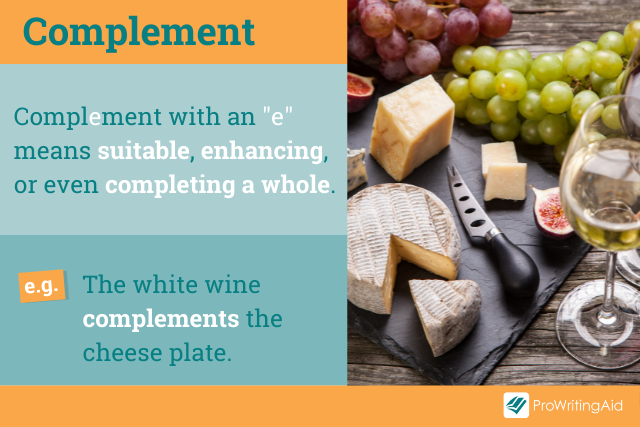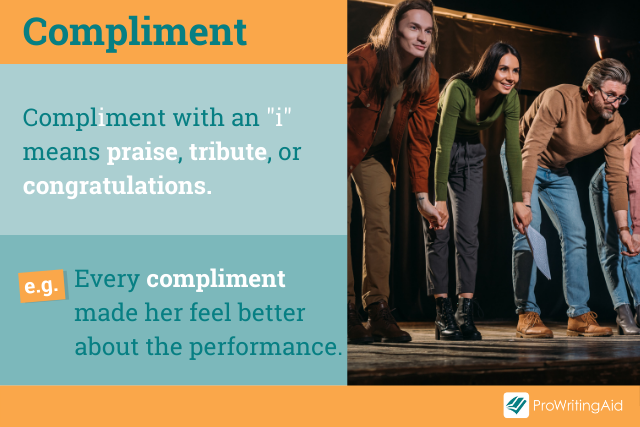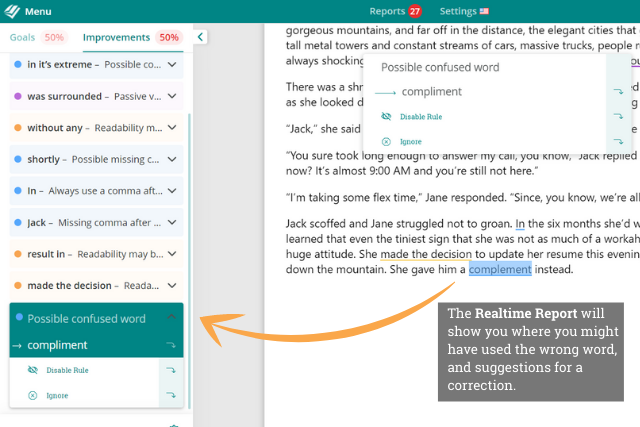Learn more about Mechanics:
AbbreviationsCapitalizationCompound Words: Everything You Need to KnowContractionsSpellingWhat is the difference between 'complement' and 'compliment'?

The words complement and compliment are often confused because of their similar spelling. Do you know the difference?
Complement means something (or someone) that completes; the consummation when used as a noun.
Complement is also used as a verb. It means to complete, to bring to perfection, to make whole.
Compliment means an expression of praise, congratulation, encouragement, or respect when used as a noun.

English is full of words that are spelt the same, with the exception of one letter. That’s what happens when you switch compliment to complement. The two words sound alike, but the switch from i to e changes the meaning.
If you’ve ever wondered when to use compliment and when to use complement, this article will make the differences clear.
What Is the Difference Between Compliment and Complement?
Complement
Complement means something that completes something else.
- The white wine complements the cheese plate.
Compliment
Compliment means to make a positive remark about something.
- Jane complimented Dave on his new hairstyle.
What Does Complement Mean?

The word complement is both a noun and verb. A noun is a person, place, or thing, while a verb is action.
As a noun, complement has two meanings. Let’s look at each.
How Do You Use the Word Complement in a Sentence?
How Do I Use Complement as a Noun?
The first definition of complement as a noun is something that completes or brings something else to perfection.
Here’s an example in a sentence:
- The necklace was the perfect complement to her dress.
Synonyms that can help you understand this version of complement as a noun:
- accompaniment
- companion
- addition
- supplement
- accessory
- adjunct
- finishing touch
- final touch
The second use of complement as a noun implies a number or quantity of something. Usually, that means the number of items required to make a group complete.
Here’s an example of complement as a noun with the second meaning:
- He has a full complement of tools in his professional kitchen.

Synonyms of complement as a noun with the second meaning:
- amount
- total
- aggregate
- contingent
- company
- capacity
- allowance
- quota
How Do I Use Complement as a Verb?
Use complement as a verb to imply adding to something to enhance or improve it—i.e. making something perfect.
- George complements his everyday clothes with his black leather jacket.
Synonyms to help you understand complement as a verb:
- accompany
- go with
- round off
- set off

Here are some example sentences using the word complement.
Your wine will be a nice complement to grilled salmon.
Love is the complement of the law.
Peaches and cream complement each other perfectly.
The neutral taste of rice makes an excellent complement to a curry.
The rational and the irrational complement each other. Individually, they are far less powerful.
Nutmeg, parsley, and cider all complement the flavor of these heirloom white beans.
Each ship in the fleet had a complement of around a dozen officers and 250 men.
The dark red drapes complement the red leather sofa.
The HR division has taken on our full complement of new trainees for this year.
A written examination will complement the practical test.
What Does Compliment Mean?

The word compliment also works in grammar as either a noun or a verb.
How Do I Use Compliment as a Noun?
As a noun, compliment means an expression of admiration or praise.
Example of compliment as a noun:
- He paid a compliment to all of Giselle’s research.
Here are some synonyms to broaden your understanding of compliment as a noun:
- flattering remark
- tribute
- accolade
- commendation
- praise
- acclaim
- homage
- admiration

Compliment as a Verb
As a verb, compliment means to say something nice about someone or praise or congratulate them.
It’s closely related to the definition of compliment as a noun, but the difference is that you use the verb form to describe an action. For example:
- Jackson complimented Erica on getting up to speed with the team quickly.
Synonyms for the verb compliment:
- commend
- bless
- praise
- congratulate
- extol
You can see how the verb is simply a way of delivering the noun.
Here are some examples of the word compliment used in sentences:
Consider it a compliment when the doorman asks for your ID.
When Jeff gets a compliment on his favorite tie, he doesn’t stop smiling.
Telling Annie she looks better now than she did before comes across as a backhanded compliment.
All the compliments from her schoolmates embarrassed her.
In my drawing class, the instructor paid me a double-edged compliment by saying my work was "excellent... for a beginner."
Just your being here is a compliment.
To be trusted is a greater compliment than to be loved.
Jose felt it was a great compliment to be asked to do the work.
Listening is the greatest compliment you can pay to anyone.
"I can live for two months on a good compliment."—Mark Twain

Are Compliment and Complement Homophones?
Complement and compliment are easy to confuse because they sound similar and are only spelled differently by one letter.
Words that sound the same but that have different meanings and spellings are called homophones. The English language has many.
Sometimes, as with these two words, it’s because the root word is the same. Other times the difference is because of the sound and spelling, like the words see and sea.
ProWritingAid has a special report to help writers make sure they are using the right word in their writing. The Homonym Report is built in to our checker so you can spot any possible wrong use and replace it with the correct word for your sentence.
ProWritingAid’s Realtime Report scans your document for any mixed-up homophones that could confuse your readers.

Download our browser extension to try it out.
How Do I Remember the Difference Between Complement and Compliment?
Both words are used as both a noun and a verb, and each has a positive meaning.
Now that you understand the difference and have seen some examples, you can use either complement or compliment in the right context.
Remember that complement with an e means suitable, enhancing, or completing a whole.
While compliment with an i means praise, tribute, or congratulations.
Use each word correctly to complement your writing and receive compliments on a well-written piece!
Take your writing to the next level:
20 Editing Tips from Professional Writers
Whether you are writing a novel, essay, article, or email, good writing is an essential part of communicating your ideas.
This guide contains the 20 most important writing tips and techniques from a wide range of professional writers.
Examples of complement in a sentence
Each seemed to enhance and complement the other.- The long road home by Danielle Steel
Her hairstyle had been chosen to complement her athleticism;- Poppy done to death by Charlaine Harris
Each has its complement of radio-equipped police cars and vans.- Men in Blue (Badge of Honor Novels (Paperback)) by W. E. B. Griffin
The wine was an ideal complement.- The Maverick by Jan Hudson
The whole idea of wine is to complement the meal.- The Cold Dish by Craig Johnson
Examples of compliment in a sentence
Every compliment hides a criticism.- Beatrice and Virgil by Yann Martel
He nodded jovially at her as if this were a high compliment.“The- Ship of magic by Robin Hobb
Valerie warmed to the compliment but at the same time felt there was something strange about it;- An affair to forget by Rachel Lindsay
I compliment you.”"talking of options, it’s the only one open.- The Aquitaine Progression by Robert Ludlum
Was that a compliment?- Deadly Fear by Cynthia Eden










